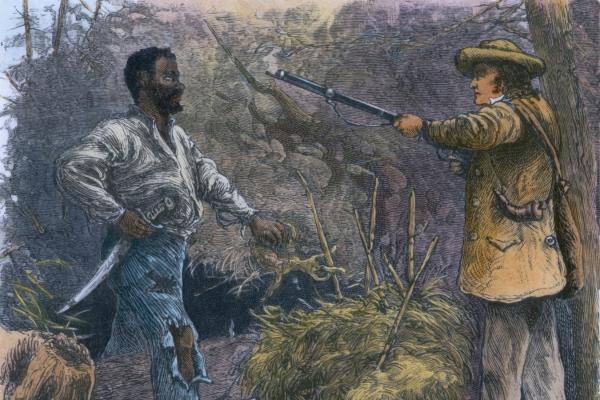WHEN ONE THINKS of black environmental liberation theology, the name of slave-rebellion leader Nat Turner might not immediately spring to mind. Perhaps it should.
A biopic on the life of Turner, called The Birth of a Nation, is scheduled for release in October. Based on early reviews, I expect the film by director Nate Parker (Red Tails, Arbitrage) to deliver a powerful recounting of Turner’s life.
In 1831, Turner led enslaved and free African Americans in a rebellion against slaveholders in Southampton County, Va. The uprising was swift, violent, and bloody. At least 200 African Americans and more than 50 whites died. After whites quelled the rebellion, Turner hid in the woods for several weeks. He was eventually captured and executed.
Turner’s time alone in the woods offers surprising insights. He is an African-American man familiar with nature. He is a Christian preacher given to visions. From that arises a deep environmental wisdom.
The original report of the slave rebellion is found in The Confessions of Nat Turner, The Leader of the Late Insurrection in Southampton VA, as told by Turner to a white lawyer in Richmond, Va. “The blood of Christ [that] had been shed on this earth, and had ascended to heaven for the salvation of sinners,” Turner says in the book, “was now returning to earth again in the form of dew.”
Turner’s visions were based on his understanding of the Bible. He was literate (that in itself was unusual for one enslaved) and worshipped God. Turner was a prophet of God, in the context of nature and revolt.
In The Confessions, he says, “I then found on the leaves in the woods hieroglyphic characters, and numbers, with the forms of men in different attitudes, portrayed in blood, and representing the figures I had seen before in the heavens. And now the Holy Ghost had revealed itself to me, and made plain the miracles it had shown me.”
His theology—an analysis of scripture, faith, and practice—galvanized him to rebel against white slavers. He incited rebellion out of his faith in a Christian God. As an enslaved man, he fought for African Americans.
TURNER’S IDEAS AND experiences are part of the history of an eco-theology based on black liberation theology. It is forged out of the history of environmental justice and activism rooted in Christian experience, worship, and theology by and of African Americans. This theology seeks transformed practices that shield African Americans from exposure to toxins, pollution, and the general effects of environmental racism.
In recent times, we have witnessed inspiring examples of faith-rooted resistance by people of African descent through black eco-theology. In 1977, Wangari Maathai organized the Green Belt Movement, which planted trees in Kenya in response to deforestation and soil erosion. Maathai recounted how Western missionaries rushed to cut down trees, counter to the experience of Maathai’s community, which saw the trees as sacred. Her great act of rebellion, as an African who embraced both her Christianity and African spirituality, was to fight for the trees to be replanted as a prayer to the earth through action.
Another example can be found in the work of Lennox Yearwood. On the 10th anniversary of Hurricane Katrina, in 2015, Yearwood, an African-American pastor and head of the Hip Hop Caucus, advocated for environmental equity for many African Americans in Louisiana who have not seen their neighborhoods, homes, and lives restored in the same way white people have. Among many other efforts, Yearwood has led marches against companies that profit from the damage done by fossil fuels to the environment.
Nat Turner, Wangari Maathai, and Lennox Yearwood are just a few of the many encouraging practitioners of ecological resistance, actions led by people of African descent and Christian faith that carry on the rich tradition of black environmental liberation theology.

Got something to say about what you're reading? We value your feedback!

